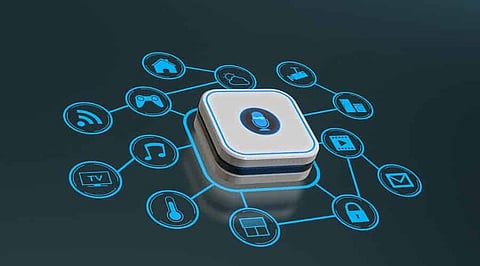

An average person speaks about 15,000 words a day. The recent revolution in technology has made us increasingly speak those words to machines. Nowadays, technology extends to all aspects of our lives. For those looking for a human touch, the Internet of Voice will significantly change how we use our connectivity.
Internet of Things (IoT) is overrated in the modern era. In a way, venture capitalists are using the existing technology to trend again and make money out of it. However, IoT is slowly slipping backward, leaving way for other emerging technologies like the Internet of Voice , which could soon become a breakthrough. The first revolution of the Internet involved connecting multiple personal computers to a giant web in 1995. The second revolution in 2010 saw the emergence of social networks. Currently, the third revolution, led by voice, is going to result in a screen-less omnipresent internet. There are a couple of reasons why the Internet of Voice is suddenly spiking. One, IoT is mostly about collecting data and then applying algorithms to extract value from the data. But the Internet of Voice is taking a different route. Instead of expecting users to know anything about the IoT, they get to ask questions and then get answers. Secondly, the voice is faster than typing. Smart speakers like Alexa stole the market quickly. Today, 53 million people in the US already own Alexa. The number of voice assistants in US homes has doubled since 2018 and is anticipated to increase to 275 million by 2023. According to Juniper Research, the Internet of Voice growth will amount to 1,000% growth in just five years.
Internet of Voice refers to both surfing through the web using your voice instead of typing and commanding smart devices. No more buttons, no more coding, no more keyboards, just ask. We all use the web as a resource to find or search for information. The rising popularity of voice commands is set to change things as users can access voice integration through smart IoT devices that will provide a different user experience. The perception of voice has changed drastically over the years. The transformation started with Siri, Apple's voice assistant. The concept was soon adopted by Google's Voice Search and Microsoft's Cortana.
Internet of Voice is seeing increasing adoption as it can be employed in the environment people want. Voice assistants are present in vehicles, making drivers utilize voice technology to help them manage their drive. Drivers can take care of calls and reply to messages. Meanwhile, they can also manage apps and play music as per their wish. At home, the voice assistant is a household name. Currently, people use the Internet of Voice at home to listen to music, surf stuff online, etc. However, in the future, the Internet of Voice will control lights, television and washing machines with just a voice command. In an interview with New Scientist, Daren Gill, director of product management for Alexa, said that half a million people proposed their love to the voice assistant device. The PwD research outlines the most common uses of voice assistant as,
• Checking the weather or news
• Playing music
• Searching for something that they'd normally type into a search engine
• Sending a text or mail
• Asking a quick question
• Speech is the natural mode of communication for humans. So people find it easy to connect verbally with machines.
• Voice assistants don't need people's attention. It just needs their voice. Users can engage in other jobs and connect with voice assistants directly.
• Voice assistants are inexpensive as they potentially challenge the need for a touch screen on many devices.
• Voice-enablement is a gift to people with disabilities. Visually impaired people use voice assistant apps to find what is in front of their eyes.
In five years, if voice recognition continues to improve at its current pace, then people may look back and wonder why they ever used a keyboard. That is the kind of vehicle we are driving at the movement. Our device of engagement remains the same. We use laptops, mobile phones, and computers to connect with voice assistants. However, instead of using keyboards to input information, we use voice to input information. The response can either be displayed on the screen or come as a voice as well. In the most unexpected scenario, the Internet of Voice might eventually make us fall out of love with smartphones.
Join our WhatsApp Channel to get the latest news, exclusives and videos on WhatsApp
_____________
Disclaimer: Analytics Insight does not provide financial advice or guidance on cryptocurrencies and stocks. Also note that the cryptocurrencies mentioned/listed on the website could potentially be risky, i.e. designed to induce you to invest financial resources that may be lost forever and not be recoverable once investments are made. This article is provided for informational purposes and does not constitute investment advice. You are responsible for conducting your own research (DYOR) before making any investments. Read more about the financial risks involved here.
